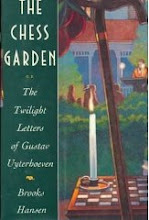The McBean Library at Cate School plays host to a gallery that regularly exhibits the work of local and often not-so-local artists. This last month they featured the work of school faculty/administration and were kind enough to invite me to exhibit some pieces. I'm hoping the images below are clickable for those who like detail...
 |
| figure drawing, reclined - black conte and charcoal (1.5'x2.5') |
 |
| figure drawing, back - red conte (2.5'x1.5') |
 |
| illustration for Caesar's Antlers, drawn from the paused image of an Olive Garden commercial - ink (7"x7") |
 |
| silver-haired eminence of the mesa - graphite (12"x12") |
 |
| Ada, one year - charcoal pencil (5"x5") |
 |
| Theo and dog - graphite and charcoal pencil (4"x2.5") |
My pieces were not new, alas, but have spurred me to get going with an illustrated version of another old story Beastie, due out from Star Pine Books by the end of the summer.
For what it's worth, I was asked to offer a brief artistic statement to accompany this exhibit. It went thus:
For what it's worth, I was asked to offer a brief artistic statement to accompany this exhibit. It went thus:
For the last
couple generations, my family has been riddled with artists – of the painterly
type. My own mother, three of her sisters, and two more cousins have been
showing and selling their work, some going all the way back to 1965 or so. Plein air for the most part -- oil,
woodcut, and watercolor. For those reasons, and a certain knack, I drew a lot
when I was younger, and figured I’d probably grow up to be an artist some day.
It was some time in high school that I recognized that that would not be
happening,
a) because I don’t have the patience
or the forbearance required to turn a facility into a calling;
b) because to the extent I do, I
think I am an illustrator.
Hence,
writing. I have in fact illustrated a couple of my books, one of which came out
back in 1997 (Caesar’s Antlers) and
another that resides in hip pocket, but which I’ll make available eventually (Beastie). Soon.
As the
drawings shown here demonstrate, my preferred subject matter has always has
been humans, in feature and attitude. I like the line, so my medium has always
been hard-tip -- pencil, charcoal, and ink.
Some day I’d like to try my hand at etching. Some time after that, maybe
I’ll get around to the oil landscapes the rest of my family favors, but
probably not. I’ve just never been able to make green work for me.
Also, I’ve
taken the occasion, kindly provided by the curators if this space, to set out
some new and some old work in my favorite medium, the word – for which I have
always had less facility, but more patience. The Chess Garden (1995) is the first in a string of formerly
published titles that I’ll be releasing under my own imprint, Star Pine Books. Let the reader note: the cover art for this new
edition was provided by recent Cate graduate and renaissance man, Ethan
Baretto. Asmodeus -- the cover of
which also features a local connection -- is new and as-yet unseen, but I’m
releasing it through Star Pine just to see if this is the way the world ends…
Who knows,
maybe if you all buy enough copies, it won't.













